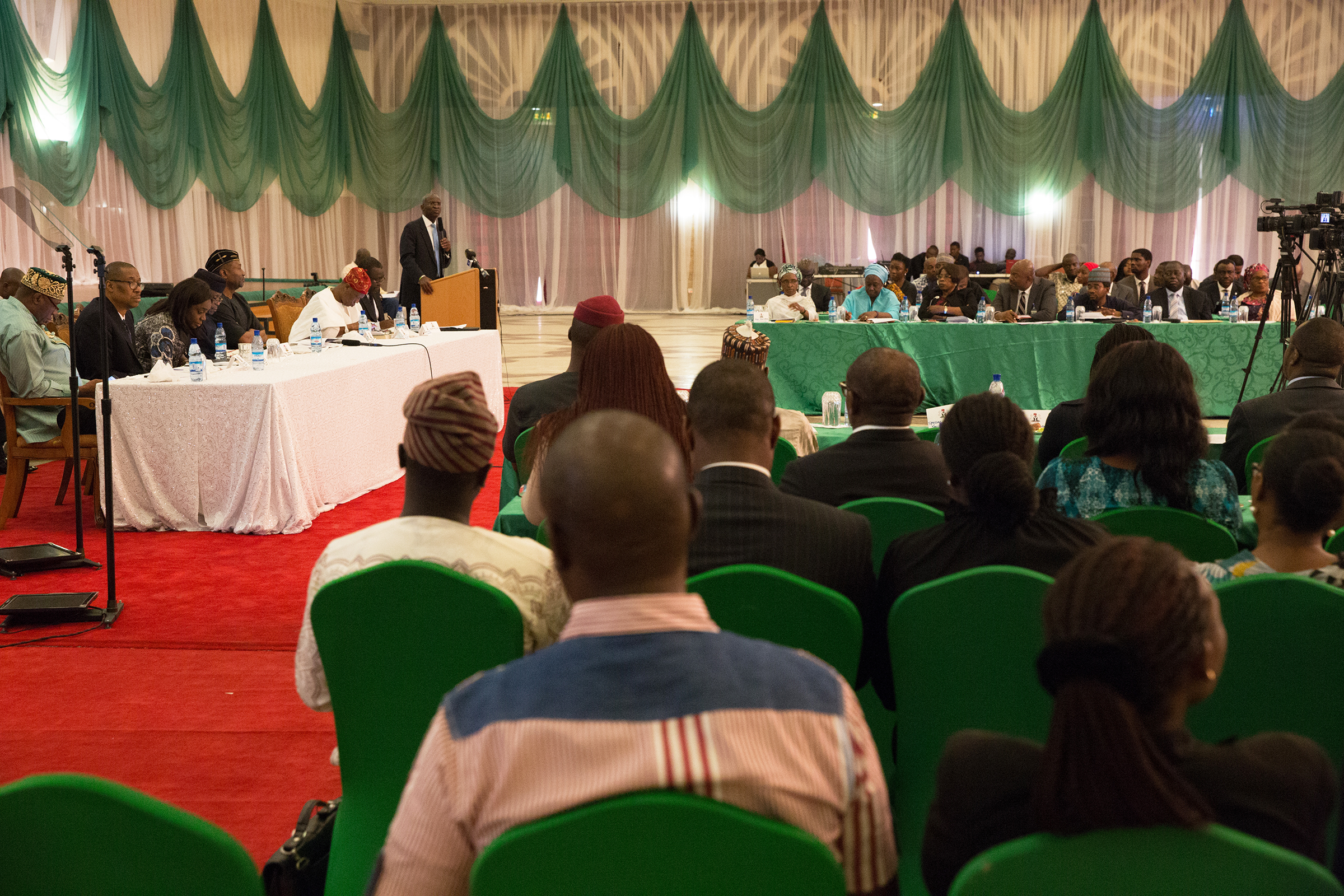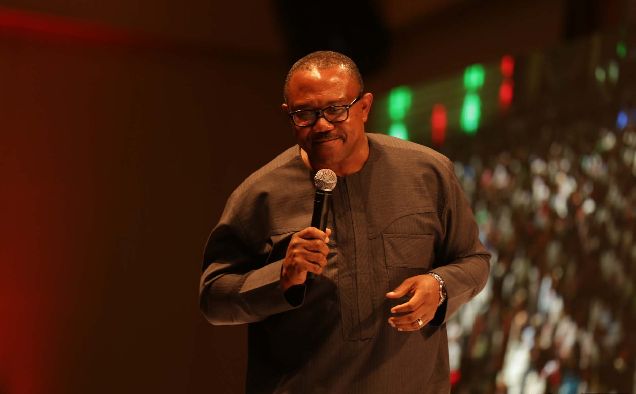Members of the organised private sector (OPS) on Monday gave a list of 12 demands, tagged “priority areas”, to the federal government on how to improve the economic fortunes of the country.
The demands include reviewing the FX ban on 41 imported items introduced by the CBN in 2015; stopping the Federal Inland Revenue Service (FIRS) from using armed men to collect taxes; monitoring the allocation of FX to manufacturers; backing out of the proposed EU/ECOWAS Economic Partnership Agreement (EPA) which they believe would de-industrialise Nigeria; and paying debts owed to local contractors.
OPS comprises the Manufacturers Association of Nigeria (MAN), Nigerian Association of Chambers of Commerce, Industry, Mines and Agriculture (NACCIMA), Nigeria Employers’ Consultative Association (NECA), Nigerian Association of Small and Medium Scale Enterprises (NASME) and Nigerian Association of Small Scale Industries (NASSI).
The presentation was made to Vice-President Yemi Osinbajo at the Second Presidential Business Forum, a platform to engage and interact with the private sector to keep them abreast with government’s policies, programmes and activities.
Advertisement
The full presentation
We commend Your Excellency for giving us the opportunity to make this presentation, which we believe, would significantly improve the economy, while strengthening the relationship between the Private Sector and the Government.
Introduction
Your Excellency, the OPS is aware of the current state of the economy and the effort the Federal Government is making to revive it. We also commend the Government for the effort at curbing the security challenges the nation has been encountering and the determination to rid our country of the destructive menace of corruption.
Advertisement
We particularly commend your administration for the diversification initiative, and most especially, for the resource based industrialization policy which Government has adopted. These policies are pivotal to the resuscitation of the economy. The OPS is fully in support of Government’s efforts and would offer any assistance possible to get the country out of the current economic quagmire.
Major Issues of Concern
Your Excellency, in order to achieve the objectives of Government towards reviving the economy; revitalizing the industrial sector; growing MSMEs and creating employment for its citizenry, we believe that the under – listed challenges should be addressed urgently:
a) Access to Foreign Exchange by the Real Sector: Access to forex has been a major challenge to businesses in the last two years. We are aware, and commend the Government on the various steps taken to resolve this issue including the standing directive by the CBN to Banks to channel minimum 60% of available Forex to manufacturers. The challenge this policy is currently facing is that there is inadequate monitoring mechanism to ensure that the policy achieves its desired result of allocating the stipulated percentage of Forex to bona fide manufacturers.
Advertisement
The CBN list of 41 items is made up of 440 tariff lines. 31 out of the CBN list of items not valid for forex contain 393 tariff lines which are finished products. Those finished products may be retained on the list of items excluded from the official foreign exchange market.
The remaining 10 items of 47 tariff lines are essential industrial raw materials that are either not readily available locally or there is a yawning gap between local production and national demand. Our position was made known to the Presidential Reconciliation Committee on this matter through the Honourable Minister of Finance in 2016.
- Government through the CBN should ensure that the 60% concessionary forex allocation to the manufacturing sector for raw materials and machinery importation is strictly implemented.
- The list of 41 items banned by the CBN from accessing FX in the interbank forex market should be reviewed, with the aim of removing raw materials components that cannot be sourced locally.
b) Diversification of the Economy and Resource Based Industrialization: We support your Administration’s push for economic diversification and resource based industrialization policy. We, however, advocate for policy consistency and coherence in order to achieve sustainability of this policy thrust. We equally urge the Government to continue to dialogue with the various stakeholders with a view to articulating more appropriate fiscal and monetary policy incentives that will ensure the realization of the goal of economic diversification.
- We strongly recommend that all major economic policies of Government geared towards diversification of the economy should be backed by law to ensure commitment and prevent reversals.
- To encourage non-oil export, we suggest that Government should diversify the utilization of the Negotiable Duty Credit Certificate (NDCC) to include payment of other government taxes and levies in order to reduce the pressure on the Nigeria Customs Service which is currently the only collecting agency.
- We also recommend that the Nigerian Industrial Revolution Plan (NIRP) should be the pillar of the effort at diversifying the economy.
c) Long Term Funding: The OPS acknowledges the commitment of Government in providing long term funding for the industrial sector through the proposed operationalization of the Development Bank of Nigeria and the recapitalization of the Bank of Industry.
Advertisement
Given the size of the Nigerian industrial sector, we recommend that Government should urgently operationalize the Development Bank of Nigeria and re-capitalize the Bank of Industry and Bank of Agriculture to broaden their long term funding capacity at not more than 5% interest rate.
d) EU/ECOWAS Economic Partnership Agreement (EPA): Nigeria, at various stages in the EPA negotiation process, voiced strong opposition to the agreement and raised concerns that the Agreement would lead to de-industrialization as it is structured to limit growth of manufacturing and investments in West Africa, particularly in Nigeria. The implication of this, if entered into, is that our economy will remain a provider of raw materials and an importer of finished products. Our concern is premised on the fact that from all parameters, West African States, including Nigeria, are not at the same level of economic development with any European country for us to conclude a reciprocal trade relationship as espoused in the EPA.
Advertisement
We commend the Government for aligning with the private sector in not signing the agreement and urge the Government not to sign the EPA document until the ultimate concerns raised by Nigeria are addressed.
e) Patronage of Made-in-Nigeria Products and Enforcement of the Procurement Act: Considering the size of Nigeria and the resources at the disposal of Government at all levels, fiscal behaviour has a major impact in driving national demand. Government should, therefore, continue to support its policy on patronising Made-in-Nigeria products by monitoring the Ministries, Departments and Agencies (MDAs) to ensure compliance with the policy.
Advertisement
Your Excellency, we believe that patronage of locally produced items would help to create employment and encourage local manufacturers. Our expenditure in favour of imported products is detrimental to the growth of local industry as it increases employment in the country of origin and simultaneously increases poverty in our land.
- The BPP thresholds for local companies/suppliers, which currently stands at N1 billion for works and N100 million for goods should be adjusted to N30 billion for works to reflect the current realities of the economy (“First Order Policy”).
- A realistic margin of preference of about 30% (as our research established) should be effectively implemented for all procurements of the Federal Government. State and Local Governments should be encouraged to follow suit.
- Micro, Small and Medium Enterprises (MSMEs) should be encouraged to participate in all public procurement through instituting a minimum of 40% participation rate.
- We urge the full implementation of the relevant portion of the Procurement Act 2006 (that aims at boosting local production) and also call for the review of the Act to cover States and Local Governments functionaries.
- The spending latitude given to MDAs should not preclude them from patronizing Made-in-Nigeria products as such prerogative is estimated to constitute almost 70% of their total spending.
g) Collapse of Basic Infrastructural Facilities e.g., Roads, Bridges, Airports, Railways and Information Technology: We applaud the efforts of the present administration in ensuring the implementation of the 2016 Budget in respect of disbursement for Capital Projects and its proposal in the 2017 Budget. However, Government resources alone would be inadequate to finance the infrastructural gap, estimated by the African Development Bank at US$300billion.
Advertisement
- Government should create the necessary regulatory framework for private sector investment in infrastructure;
- The pronouncement by Mr. President to utilize Public Private Partnership (PPP) should be effectively implemented;
- The process of selecting such investors should be transparent.
f) Challenges with Policy Environment — A Need for Seamless Coordination and Synergy between Fiscal and Monetary Policies: There is the need for seamless coordination and synergy between Fiscal and Monetary policies in driving the economy. More than ever before, it is now critical to concentrate our best efforts at ensuring that alignment of these policies is targeted at creating an enabling environment for industries to thrive, improving productivity of labour and disposable incomes for workers.
h) Low Investment in Agriculture & Agro-Allied Businesses: According to the Central Bank of Nigeria, the Anchor Borrowers Programme (ABP) is intended to create a linkage between anchor companies involved in processing and small holder farmers (SHFs) of key agricultural commodities. The programme thrust of the ABP is the provision of farm inputs in kind and cash (for farm labour) to small holder farmers.
We recommend that the scheme be expanded to include medium-scale as well as large-scale integrated processors to act as Anchor companies, so as to increase private sector involvement in the scheme in order to boost production of key commodities, stabilize supply of inputs to agro processors and address the country’s food deficit.
j) Prohibitive gas pricing for industrial users and wrong classification as commercial users. The non-bench marking of the local price of gas against international pricing mechanism has made the price in Nigeria one of the most expensive in the world. The price of gas in Nigeria denominated in US dollar is currently selling at US$7.56/cubic meter for industrial users and this has added to the cost of production in the country thereby making locally manufactured goods uncompetitive.
In addition, manufacturers that depend on gas to power their plants are wrongly classified as commercial users who engage in retail trade of the commodity. Considering the current poor state of public power supply in the country, and the critical importance of it in manufacturing production process, we recommend that Government should re-categorize the manufacturers using gas from commercial to industrial users. This will bring them at par with power generating companies in term of pricing.
k) Multiple Levies by Government Agencies on Same Sales Promotion: Currently, any sales promotion to be embarked upon by a company is required to be registered with NAFDAC, CPC and National Lottery Regulatory Commission (NLRC), upon payment of huge registration fees that are based on the value of each sales promotion. This is in addition to the fees to be paid to the lottery commission in each state where the promotion is to be held and the Advertising Practitioners Council of Nigeria. This is a big financial burden on any company that is only trying to stimulate sales in this very challenging environment.
We recommend that government advises its regulatory agencies to ensure that only one fee is charged for a particular transaction. There is no reason why NAFDAC, CPC and NLRC (which are all federal government agencies) should charge separate fees for the same sales promotion, thereby increasing the cost of doing business in Nigeria.
l) Invasion of Premises of Members for the Purpose of Collecting Taxes: Recently, the FIRS have been invading premises of companies to force them to pay corporate taxes even when such assessments are yet to be finalized. For example, FIRS invaded the premises of GSK with armed policemen in July 2016 and forcefully collected N200 million before leaving the premises, despite the fact that the said tax assessment was yet to be finalized as required by law.
We appeal to the government to prevail on the FIRS to follow the laid down procedure by tax laws for recovering taxes owed by companies instead of the gestapo approach currently adopted, which has the tendency of discouraging investors.
m) Outstanding Payment/Debt to Contractors: We acknowledge government efforts at ensuring that the outstanding debts to local contractors are paid. However, we wish to aver that non-payment of the debt including interest thereon has significantly limited the level of business activities in the economy and particularly the manufacturing sector which has both direct and indirect links to these contractors.
We therefore urge Government to give priority attention to defraying these legacy debts to enable the companies/creditors involved to return to business and boost the economy.
Conclusion
Your Excellency, once again, we commend the government for instituting this engagement with the Organised Private Sector and express the hope that we shall be able to speedily move from talk to action on the above issues. This is the only way we can make the efforts worth the while.
Add a comment






